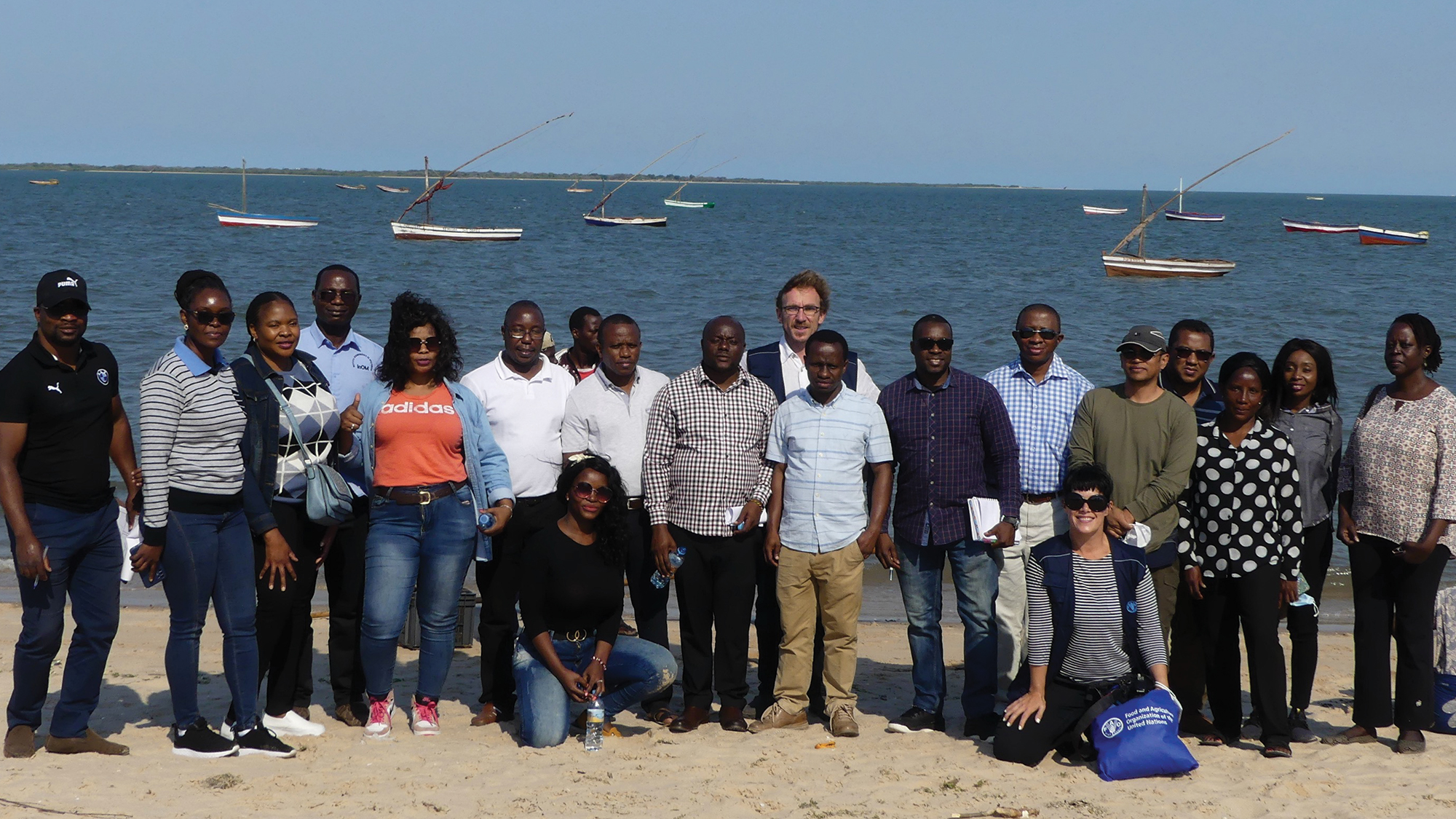Fisheries experts in Africa adopt skills to lead training courses on the ecosystem approach to fisheries
 Participants at the training of trainers course in Maputo, Mozambique in August 2022. © FAO/Matthieu Bernardon
Participants at the training of trainers course in Maputo, Mozambique in August 2022. © FAO/Matthieu Bernardon
August 2022, Maputo, Mozambique – The ocean provides food and job security to millions of people worldwide. Yet, threats like climate change, pollution and overfishing are putting the future of the ocean and the people who depend on it at risk.
One way to improve ocean health is with the ecosystem approach to fisheries (EAF), a holistic and risk-based management approach that is promoted by the EAF-Nansen Programme and considered by FAO to be the principal framework for achieving sustainable fisheries. It takes into consideration the ecological, human, and social dimensions of sustainability, aiming to reconcile a broader set of technical, policy, and governance sustainability objectives in a more participatory and adaptive fashion.
“Sustainable fisheries management systems are essential to rebuild fishery stocks, increase catches and restore ecosystems to a healthy and productive state while managing exploited resources within ecosystem boundaries,” said Merete Tandstad, Coordinator of the EAF-Nansen Programme.
To promote EAF in regional and national efforts across partner countries, the EAF-Nansen Programme has developed training courses for technical experts with background in fisheries and with experience from areas related to fisheries research or management or ocean governance.
Designed to provide insight on the EAF principles and the process for the development of fisheries management plans, and the EAF implementation monitoring tool, the aim is for participants to adopt skills necessary to lead future training courses on EAF and develop the capacity of fisheries management institutions to sustainably manage fisheries.
“As fisheries scientists and managers, we have all come to accept that managing fisheries requires a multifaceted approach that takes all elements of a fishery into consideration,” said Gladys B.M Okemwa, a Senior Research Scientist in Fisheries and Conservation from the Kenya Maritime and Fisheries Research Institute, who attended the training of trainers at the University of Éduardo Mondlane in Maputo, Mozambique, along with 24 experts from Kenya, Madagascar, Angola, Mozambique, Namibia and Tanzania.
At the training in Maputo, participants received behind the desk lectures, discussed and prepared presentations on assigned topics related to EAF using case studies from their own countries, such as the shrimp fishery in Mozambique and Madagascar, the prawn fishery in Kenya, and the small pelagic fishery in Tanzania and Angola. This made it possible for exchanges of experiences on fisheries management according to the EAF between the six countries present.
“For me, the training on the EAF implementation monitoring tool was particularly interesting and timely as it will be key in helping us to track our fisheries in a standardized and objective manner. I am looking forward to applying the knowledge gained and training my colleagues'' Ms Okemwa said.
Deborah Catena and Matthieu Bernardon, both Fisheries Experts from the EAF-Nansen Programme, were two of the course leaders together with Maria Ascenção Ribeiro Pinto, a fisheries expert from Mozambique.
The benefits of the EAF training of trainers will have a long-term impact on the fisheries management process Matthieu Bernardon explained, and added: “With the best available knowledge at hand, the capacity development will continue when the trainers return to their countries. There, they will pass on the knowledge to fellow researchers, fisheries managers and other stakeholders.”
Next steps
The collaboration between the EAF-Nansen Programme and Éduardo Mondlane University on the training of trainers was a success, partly due to the participation of the Mozambican trainer Maria Ascenção Ribeiro Pinto who provided practical experience from fisheries management planning that was welcomed by the other participants. The diverse group of participants was another positive aspect, as it allowed for a variation of perspectives to be envisaged and collaborations for the development of capacities on EAF to be explored.
As a next step, the University of Éduardo Mondlane will work with the EAF-Nansen Programme to look into the possibility of developing a specific and permanent module on EAF within the University curriculum, and explore if it can be replicated in other areas.
More on the topic:
